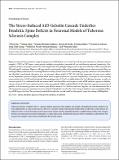The Stress-Induced Atf3-Gelsolin Cascade Underlies Dendritic Spine Deficits in Neuronal Models of Tuberous Sclerosis Complex
Author(s)
Nie, Duyu; Chen, Zehua; Ebrahimi-Fakhari, Darius; Di Nardo, Alessia; Julich, Kristina; Robson, Victoria K.; Cheng, Yung-Chih; Woolf, Clifford J.; Heiman, Myriam; Sahin, Mustafa; ... Show more Show less
DownloadNie-2015-The Stress-Induced A.pdf (2.702Mb)
PUBLISHER_CC
Publisher with Creative Commons License
Creative Commons Attribution
Terms of use
Metadata
Show full item recordAbstract
Hyperactivation of the mechanistic target of rapamycin (mTOR) kinase, as a result of loss-of-function mutations in tuberous sclerosis complex 1 (TSC1) or TSC2 genes, causes protein synthesis dysregulation, increased cell size, and aberrant neuronal connectivity. Dysregulated synthesis of synaptic proteins has been implicated in the pathophysiology of autism spectrum disorder (ASD) associated with TSC and fragile X syndrome. However, cell type-specific translational profiles in these disease models remain to be investigated. Here, we used high-fidelity and unbiased Translating Ribosome Affinity Purification (TRAP) methodology to purify ribosome-associated mRNAs and identified translational alterations in a rat neuronal culture model of TSC. We find that expression of many stress and/or activity-dependent proteins is highly induced while some synaptic proteins are repressed. Importantly, transcripts for the activating transcription factor-3 (Atf3) and mitochondrial uncoupling protein-2 (Ucp2) are highly induced in Tsc2-deficient neurons, as well as in a neuron-specific Tsc1 conditional knock-out mouse model, and show differential responses to the mTOR inhibitor rapamycin. Gelsolin, a known target of Atf3 transcriptional activity, is also upregulated. shRNA-mediated block of Atf3 induction suppresses expression of gelsolin, an actin-severing protein, and rescues spine deficits found in Tsc2-deficient neurons. Together, our data demonstrate that a cell-autonomous program consisting of a stress-induced Atf3-gelsolin cascade affects the change in dendritic spine morphology following mTOR hyperactivation. This previously unidentified molecular cascade could be a therapeutic target for treating mTORopathies.
Date issued
2015-07Department
Massachusetts Institute of Technology. Department of Brain and Cognitive Sciences; Picower Institute for Learning and MemoryJournal
Journal of Neuroscience
Publisher
Society for Neuroscience
Citation
Nie, D., Z. Chen, D. Ebrahimi-Fakhari, A. Di Nardo, K. Julich, V. K. Robson, Y.-C. Cheng, C. J. Woolf, M. Heiman, and M. Sahin. “The Stress-Induced Atf3-Gelsolin Cascade Underlies Dendritic Spine Deficits in Neuronal Models of Tuberous Sclerosis Complex.” Journal of Neuroscience 35, no. 30 (July 29, 2015): 10762–10772.
Version: Final published version
ISSN
0270-6474
1529-2401